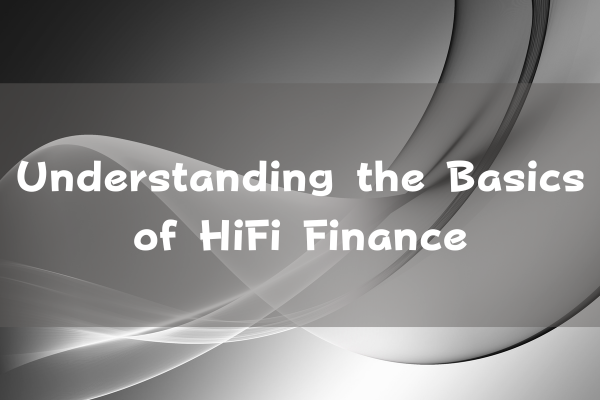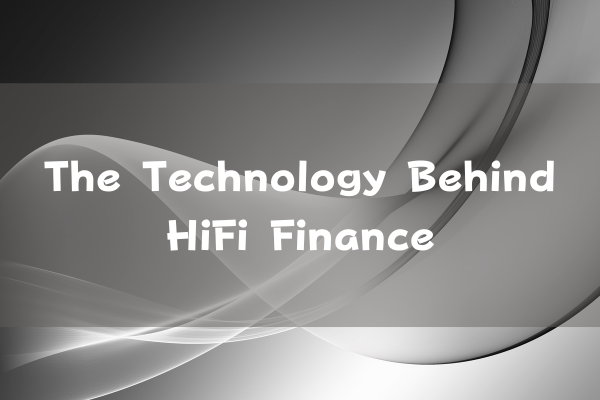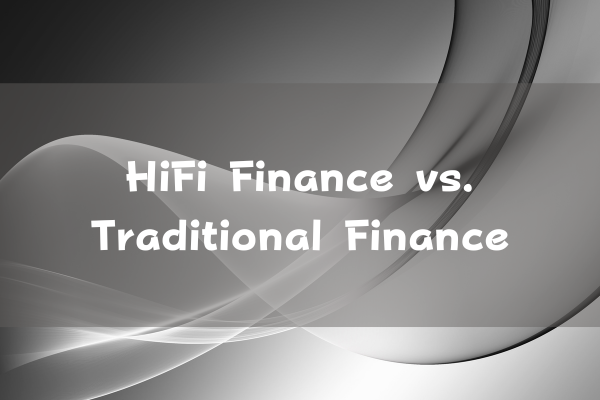In the ever-evolving landscape of cryptocurrencies, HiFi Finance has emerged as a promising contender that seeks to revolutionize the way we perceive and interact with digital assets. This groundbreaking cryptocurrency has gained significant attention for its innovative approach to decentralized finance (DeFi) and its potential to disrupt traditional financial systems. In this article, we will explore the world of HiFi Finance, its underlying technology, its key features, and its potential impact on the cryptocurrency market and the broader financial sector.
Detailed Articles are here
https://bitcastle.io/column/en/post-10874/
目次
Understanding the Basics of HiFi Finance

HiFi Finance is a relatively new cryptocurrency that combines the principles of decentralized finance with cutting-edge technology to create a financial ecosystem that is accessible to anyone with an internet connection. Before delving deeper into its intricacies, let’s start by understanding some fundamental aspects of HiFi Finance:
|
Name |
HiFi Finance |
|
Token Symbol |
HIFI |
|
Price |
$67,894,547 |
|
Official page |
|
|
X (Twitter) |
What is HiFi Finance?
HiFi Finance, often referred to simply as “HiFi,” is a cryptocurrency built on blockchain technology. It operates on a decentralized network, which means it is not controlled by any central authority like a government or a financial institution. Instead, it relies on a distributed ledger system to record and verify transactions, ensuring transparency and security.
The Birth of HiFi
HiFi Finance was launched in [Insert Year], making it a relatively young cryptocurrency in the market. Its creation was driven by a group of visionary developers and blockchain enthusiasts who aimed to address some of the shortcomings of traditional financial systems, such as lack of accessibility, high transaction fees, and centralized control.
Key Features of HiFi Finance
One of the distinguishing features of HiFi Finance is its focus on accessibility and inclusivity. Unlike traditional financial systems that may require individuals to have a bank account or access to a specific geographical location, HiFi Finance can be accessed by anyone with an internet connection. Additionally, it offers several other key features:
Decentralization
HiFi operates on a decentralized network of nodes, making it resistant to censorship and control by any single entity. This decentralized nature enhances security and reduces the risk of manipulation.
Low Transaction Fees:
Traditional financial systems often impose high fees for cross-border transactions. HiFi Finance aims to reduce these costs significantly, making it an attractive option for global transactions.
Smart Contracts
HiFi utilizes smart contracts, which are self-executing contracts with predefined rules. These contracts enable automated and trustless transactions, eliminating the need for intermediaries.
Yield Farming
HiFi Finance allows users to participate in yield farming, a DeFi practice where users provide liquidity to the platform and earn rewards in return. This feature has attracted many users looking to maximize their cryptocurrency holdings.
The Technology Behind HiFi Finance

To truly appreciate the potential of HiFi Finance, it’s essential to delve into the technology that powers this cryptocurrency. At its core, HiFi relies on blockchain technology, but it also incorporates several innovative concepts that set it apart from its competitors.
Blockchain Technology
HiFi Finance, like many other cryptocurrencies, is built on blockchain technology. Blockchain is a distributed ledger that records all transactions across a network of computers, known as nodes. Each transaction is grouped into a block and linked together in a chronological order, creating an immutable and transparent ledger.
Consensus Mechanisms
One critical aspect of blockchain technology is the consensus mechanism that governs how transactions are validated and added to the blockchain. HiFi Finance primarily relies on [Insert Consensus Mechanism], which ensures that all network participants agree on the validity of transactions without the need for a centralized authority.
Smart Contracts
Smart contracts are a cornerstone of HiFi Finance’s functionality. These self-executing contracts are programmed with predefined rules and conditions. When these conditions are met, the smart contract automatically executes the agreed-upon actions. HiFi Finance’s use of smart contracts allows for automated and trustless transactions, reducing the need for intermediaries and minimizing the potential for disputes.
Decentralized Applications (DApps)
HiFi Finance also supports decentralized applications, often referred to as DApps. These are applications built on top of the HiFi blockchain that leverage its infrastructure and smart contract capabilities. DApps offer a wide range of functionalities, from decentralized exchanges to lending platforms, giving users access to a plethora of financial services.
HiFi Finance and Decentralized Finance (DeFi)

One of HiFi Finance’s primary goals is to advance the field of decentralized finance (DeFi). DeFi represents a paradigm shift in traditional finance by leveraging blockchain technology to create open, permissionless, and trustless financial services. HiFi Finance plays a pivotal role in this ecosystem, offering a range of DeFi services and innovations.
HiFi Finance in DeFi Ecosystem
HiFi Finance integrates seamlessly into the DeFi ecosystem, providing users with various DeFi services such as decentralized exchanges, lending platforms, and yield farming opportunities. These services enable users to trade, borrow, and earn interest on their cryptocurrencies without relying on traditional financial institutions.
Liquidity Provision
Liquidity provision is a crucial component of DeFi, and HiFi Finance allows users to become liquidity providers. By staking their cryptocurrencies in liquidity pools, users can facilitate trading on decentralized exchanges and earn fees and rewards in return. This incentivizes users to participate actively in the DeFi ecosystem while earning a passive income.
Yield Farming and Staking
HiFi Finance’s yield farming and staking mechanisms have attracted significant attention from crypto enthusiasts. Users can stake their HiFi tokens or other supported cryptocurrencies and earn rewards, typically in the form of additional tokens or interest. This has created opportunities for users to grow their crypto holdings while contributing to the security and stability of the network.
Decentralized Governance
Another notable aspect of HiFi Finance’s DeFi involvement is its approach to governance. HiFi operates using a decentralized autonomous organization (DAO) structure, allowing token holders to participate in decision-making processes. Token holders can propose and vote on changes to the network, ensuring that the community has a say in its development and governance.
HiFi Finance vs. Traditional Finance

HiFi Finance’s emergence raises questions about how it compares to traditional finance and whether it has the potential to replace or complement traditional financial systems. Let’s examine some key differences and potential advantages of HiFi Finance over its traditional counterparts:
Accessibility and Inclusivity
Traditional finance systems often require individuals to have access to banks, credit scores, and physical infrastructure. HiFi Finance, on the other hand, is accessible to anyone with an internet connection, bridging the financial inclusion gap and providing financial services to the unbanked and underbanked populations.
Transparency
HiFi Finance’s use of blockchain technology ensures transparency, as all transactions are recorded on a public ledger that can be audited by anyone. This contrasts with traditional finance, where transparency is often limited, and consumers may not have full visibility into the inner workings of financial institutions.
Reduced Costs
One of HiFi Finance’s main selling points is its ability to significantly reduce transaction fees and operational costs. Traditional financial institutions may charge hefty fees for international transfers and currency exchange, while HiFi Finance offers a cost-effective alternative.
Decentralization
HiFi Finance’s decentralized nature eliminates the need for intermediaries, reducing the risk of censorship, corruption, and manipulation. In traditional finance, intermediaries like banks and payment processors play a central role, which can lead to inefficiencies and vulnerabilities.
Risks and Challenges
While HiFi Finance holds immense promise, it is not without its share of risks and challenges. Understanding these potential drawbacks is essential for both investors and the broader cryptocurrency community:
Regulatory Concerns
The cryptocurrency space is still evolving, and regulatory frameworks vary widely across countries. HiFi Finance and other cryptocurrencies may face regulatory challenges and uncertainty, which could impact their adoption and use.
Security Risks
While blockchain technology is touted for its security, vulnerabilities and exploits can still occur. HiFi Finance must remain vigilant against security threats, such as hacking attempts and smart contract vulnerabilities, to protect user funds and maintain trust.
Market Volatility
Cryptocurrency markets are known for their high volatility, and HiFi Finance is no exception. Investors in HiFi and other cryptocurrencies should be prepared for price fluctuations and carefully manage their risk.
Adoption and User Education
Widespread adoption of HiFi Finance and DeFi as a whole requires user education and awareness. Many potential users may not fully understand the complexities of blockchain technology and DeFi services, which can hinder adoption.
HiFi Finance’s Potential Impact

The potential impact of HiFi Finance extends beyond the realm of cryptocurrencies and DeFi. As it continues to grow and evolve, it has the potential to influence various aspects of the financial industry and beyond:
Financial Inclusion
HiFi Finance can play a pivotal role in promoting financial inclusion by providing access to financial services for individuals who are excluded from traditional banking systems. This has the potential to lift millions out of poverty and empower marginalized communities.
Disrupting Traditional Finance
As HiFi Finance gains traction, it poses a significant challenge to traditional financial institutions. Banks, payment processors, and other intermediaries may need to adapt or face obsolescence as more users turn to decentralized alternatives.
Cross-Border Transactions
The ability to conduct low-cost cross-border transactions through HiFi Finance can reduce the barriers to global trade and commerce. This could have a profound impact on international business and remittance services.
Decentralized Autonomous Organizations (DAOs)
The governance model employed by HiFi Finance, known as a DAO, could inspire similar decentralized decision-making structures in various industries, leading to more transparent and democratic governance.
Conclusion
HiFi Finance is poised to reshape the cryptocurrency landscape and revolutionize the way we think about finance. Its focus on accessibility, decentralization, and innovative DeFi services has garnered significant attention from both users and investors. While challenges and risks remain, the potential for HiFi Finance to bring financial services to underserved populations, disrupt traditional finance, and promote transparency and inclusion cannot be overlooked. As it continues to develop and mature, HiFi Finance may become a cornerstone of the future of finance.



